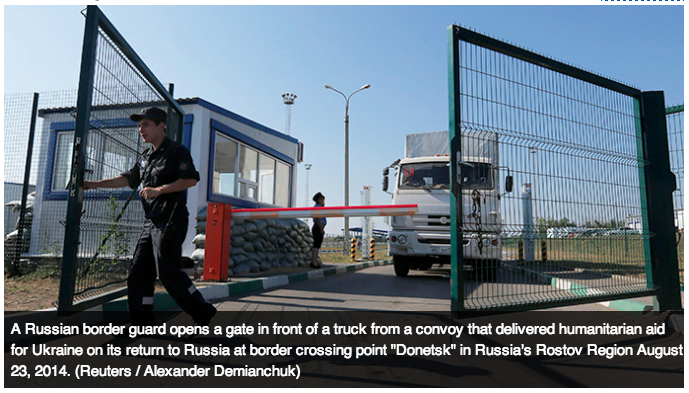MISSION COMPLETED: Moscow confirms delivery of aid to E. Ukraine, trucks return to Russia
RT.com
Russia’s Foreign Ministry has confirmed humanitarian aid has been delivered to the besieged city of Lugansk in eastern Ukraine. Meanwhile all trucks that delivered aid had returned to Russia.
“We express our satisfaction that the Russian humanitarian aid for those in need in southeastern Ukraine has been delivered as intended. We were motivated only by the goal of helping civilian citizens in need,”the statement read.
All trucks have returned empty, Ukrainian and Russian border guards confirmed, Russian Deputy Emergency Minister Eduard Chizhikov said.
“There were 227 trucks in the humanitarian operation participating in the operation, and they have all returned. All those vehicles have been searched by the representatives of the customs and border control, both on the Ukrainian and Russian side. No issues have been pointed out. All vehicles were empty upon returning, and the media representatives checked that, too, while they were filming the search,” Chizhikov stated.
The Organisation for Security and Cooperation in Europe (OSCE) also confirmed that all 227 vehicles that entered Ukraine as part of a Russian aid convoy have now returned home.
The Russian Foreign Ministry also said that they were “getting a lot of feedback from the residents of Lugansk, who were thankful for such a good attitude from the Russian part.”
It also underlined that the Russian representatives of the Red Cross were in close cooperation with the leadership and employees of the International Committee of Red Cross (ICRC), and the ICRC has proved to be “a responsible partner.”
The Ministry has also reacted to the comment of NATO General Secretary Anders Fogh Rasmussen that the humanitarian convoy entered Ukraine without consent from the authorities in Kiev and ICRC involvement, describing his words as “another lie.”
Russia’s Defense Ministry has denied “another portion of accusations” by representatives of NATO against Russia. The latest claims include allegations that Russia directly involved its military and heavy weaponry in fighting on the Ukrainian territory.
“We’ve stopped paying attention to Mr. Rasmussen’s empty talk and his press secretary. There is no point commenting on them. There is no proof there except Twitter,” official representative of Russia’s Defense Ministry Igor Konashenkov stated.
“I would like to remind you that the official powers of Mr. Rasmussen ended on July 31, and today he’s acting not so much for the alliance, but as the organizer of the September 4 NATO summit in Wales. We understand that his prospects will depend on the promotion of that event,” the statement also said.
The Russian Foreign Ministry confirmed “the intention to continue cooperation with the ICRC in the efforts to provide the humanitarian aid for the residents of southeastern Ukraine.”
The International Committee of the Red Cross (ICRC) has announced it’s planning to expand its operations in eastern Ukraine.
“We are planning to expand our activities in Lugansk and eastern Ukraine as a whole. The ICRC team has begun assessing the needs,” Anastasia Isyuk, the aid organization’s spokeswoman, told Itar-Tass news agency.
Red Cross activities in the war-torn areas will be boosted as soon as the ICRC advance group, working in Lugansk since August 20, concludes its negotiations with the sides involved in the conflict, she said.
“They meet constantly with representatives of the warring sides despite continuous shelling, evaluate performance and assess the regions’ needs,” the spokeswoman explained.

Lugansk residents have already expressed hope that Russia will provide more humanitarian aid in the future, first vice premier of the Lugansk People’s Republic Vasily Nikitin told RIA Novosti.
“We don’t have any food left, and we hope that Russia won’t leave us in this situation and these humanitarian convoys containing food will become commonplace. We hope for the help, and we need it,”Nikitin stated.
It comes as all trucks have already returned to Russia after delivering the aid.
The convoy approached the Russian-Ukrainian border on August 14, and only entered Ukraine a week later, as Kiev had been postponing its final approval for the trucks to go ahead.
